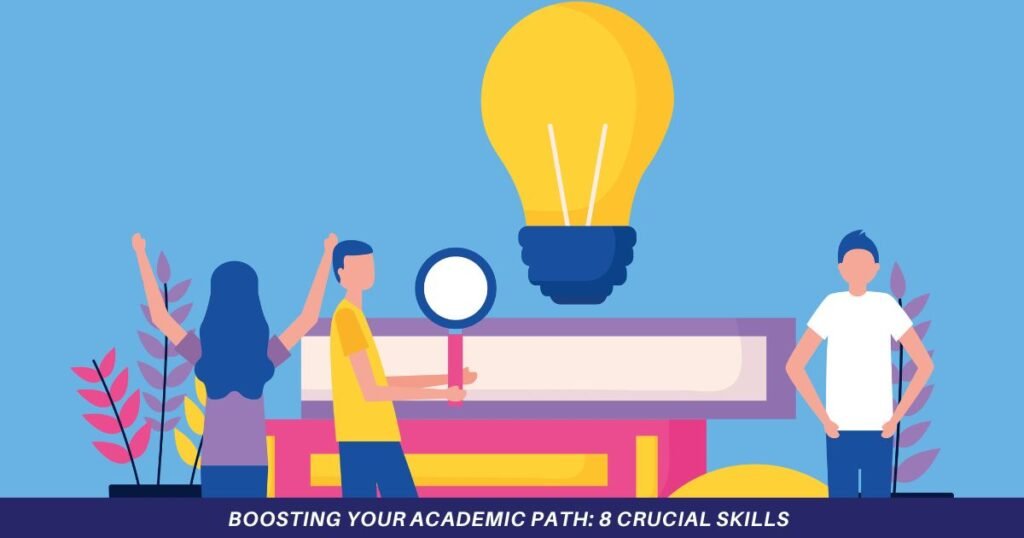
Doing well in academics goes beyond memorising knowledge and passing examinations. You will need a solid foundation of abilities to succeed and learn new things. These abilities will help you succeed in research projects and research career. We will discuss eight crucial qualities that can aid your academic path.
What are the academic skills?
Academic talent is a technique for learning that improves study and memory. These abilities help you comprehend each subject’s essential teachings and learn more quickly.
Students’ study abilities rely on their performance in reading, writing, and technical courses, such as science and mathematics, and creative disciplines, such as art and literature. Better academics may help you study and pass examinations, get along with classmates, pay attention in class, and accomplish tasks. Most of these talents are useful, both at work and elsewhere.
8 crucial academic skills:
- Good time management: Juggling with academics, family, and mental health might be difficult. Not to worry! Time management is your hidden weapon. Planning helps you manage your time, get things done faster, and reduce stress. Plans, timetables, and work applications help you to keep organised. Good time management involves resting and recharging, which will help you maintain a healthy school and reserach life.
- Active learning methods: Do you think, but do you not speak? You need more than idle studying to succeed in academia. Active learning requires interaction to improve comprehension and retention. Instead of passively reading or listening, take notes, summarise key aspects, discuss ideas with others, and apply what you have learned to projects or practice problems. Using the content transforms you from a passive learner to an active participant.
- Critical thinking and problem-solving: Instead of memorising information, develop problem-solving and critical thinking skills. These abilities enable objective analysis, trend identification, and planned issue solving. Critical thinking involves questioning ideas, examining evidence, and making well-reasoned statements. You must split an issue into smaller sections, come up with solutions, and then evaluate their effectiveness in solving it. If you master these techniques, you can study independently and confidently tackle any academic assignment.
- Effective Written and Verbal Communication: Effective and concise communication is crucial in academics and life. Communicating successfully allows you to express yourself, hold crucial discussions, and present your work. You may enhance your writing by arranging articles, papers, and presentations and applying solid evidence. Participate in class lectures, confidently convey your views, and provide constructive feedback to peers to improve your speaking skills. Remember that clear, concise communication is vital to academic and professional success.
- Research and information gathering: Navigating today’s vast information base is crucial. Knowing how to study and apply information literacy allows one to identify credible sources, assess data, and use it responsibly. Use correct phrases and sources to search well. Learn critical assessments to determine a source’s reliability by considering its author, publication date, and bias. Use correct citations and references to maintain the integrity of your work and acknowledge your sources.
- Reading comprehension and analysis: Reading comprehension is essential for academic achievement. They assist you in grasping complex materials, uncovering key points and evidence, and extracting relevant information. Underline, take notes, and summarise key topics while reading. Learn to be more critical by analysing the author’s intent, text’s structure, and well-supported ideas. Actively reacting to the material and increasing your analytical abilities can improve your comprehension and critical thinking.
- Self-control and motivation: Academic success requires self-motivation and dedication. This helps you to remain focused, solve difficulties, and persevere when things go tough. Set achievable objectives, acknowledge your victories, and visualise your long-term goals to motivate yourself. Setting a study routine, minimising distractions, and managing time can help concentrate. Self-discipline and determination may be learned and improved to help achieve academic objectives.
- Collaboration and teamwork: Many academic settings require teamwork. Teamwork and cooperation abilities allow you to communicate, exchange ideas, and work towards a goal. Pay attentively, clarify your arguments, and provide constructive remarks to enhance your speaking ability. Respect other perspectives, accept responsibility for your job, and celebrate team achievements to learn how to work together. Improving your teamwork skills can help you learn and succeed in a society that increasingly values collaboration.
Benefits of learning academic skills
Developing strong academic abilities may result in many advantages, both in the near term and in the long run. Some of the most important benefits are as follows:
- Improved academic performance: This appears to be the primary advantage. Good academic path abilities help you remember things, perform well on examinations, and receive higher marks.
- Increased efficiency and productivity: If you arrange, study, and manage your time correctly, you can accomplish jobs more quickly and have more time for other things.
- Enhanced critical thinking and problem-solving skills: To succeed in academics, you must think critically and solve issues that will serve you throughout your life. These abilities may help you analyse what you read, solve issues, and make wise decisions.
- Improving social skills: Clear communication is essential for academic and career success. You may communicate better and collaborate more readily by improving your writing, reading, and speaking.
- Boosted self-confidence and self-esteem: Good grades may boost self-esteem and achievement. This may improve your mood and readiness for new activities.
- Preparation for future success: Academic accomplishments will prepare you for personal and career success. Use them anywhere to develop a lifelong foundation for learning and achievement.
Why academic skills are important?
Academic abilities are crucial for numerous reasons that impact academic and personal growth: 1. Enhanced learning performance: Working requires mental strength. They teach you how to learn, remember, and solve issues. Improved outcomes and knowledge entail improved comprehension, critical thinking, and academic achievement.
- Lifelong learning: Academic skills help youngsters embrace studying outside school. If you are skilled at research, critical thinking, and problem solving, you can learn and adapt independently throughout life. This allows you to constantly learn and grow to remain relevant in a changing environment.
- Transferable skills: Many academic skills may be employed in personal and professional life. Writing and speaking allows you to develop connections and communicate effectively wherever you are. Time management at school and in research can help you become more structured and productive in other aspects of life.
- Increased self-confidence: You feel confident and booming when learning new intellectual skills. skills. Taking on challenging professions and achieving academic objectives may boost self-esteem. This boost in confidence might help you tackle new activities and work hard to achieve your goals.
Tips for mastering academic skills:

It takes time to build a strong base of academic skills, but if you work hard, you can greatly improve your learning and achievements. This is a more in-depth look at the tips we already discussed, along with some other ideas to think about:
- Organisation and planning
- Create a study schedule: Fit your strategy to your learning style and course requirements. Set aside time for each topic, remembering assignments, and exam deadlines. Apps, digital schedules, and traditional notebooks may help organise appointments.
- Prioritise effectively: Determine which tasks or topics require the greatest attention. Use the Eisenhower Matrix to prioritise and expedite tasks to maximise time.
- Active learning
- Engage beyond lectures: Online resources such as podcasts, training videos, and lecture notes may supplement your academic learning. Read similar tales or watch films to obtain alternative perspectives.
- Learn active listening: Watch how classes are planned and conducted. Find key concepts, supporting evidence, and exam questions. Take brief notes or use acronyms to recall crucial information.
- Record and summarise: Mark noteworthy passages, look up new terms, and write questions in the margins. Summarise the main points after each chapter or section. This helps individuals comprehend and identify their learning needs.
Effective studying
- Vary your study technique: Do more than just memorise it. Try concept mapping, self-explanation, or the Feynman Technique to simplify complex concepts.
- Utilise spaced repetition: review your notes and critical points often, giving yourself extra time between checks. Thinking about things for longer periods of time improved memory. This may be done using flashcards or timed repetition applications.
- Test yourself: Make quizzes, answer previous exam questions, or take online practice tests to assess your knowledge and areas of improvement.
Conclusion: Boosting Your Academic Path
Your academic path helps you learn and progress. Learn essential academic skills to make this trip easier. Time management and critical thinking can help you succeed in school and research life. Remember that success requires hard effort, dedication, and a willingness to embrace learning’s challenges and rewards. Thus, start your academic career with confidence and knowing you can succeed.`
Relevant Article
